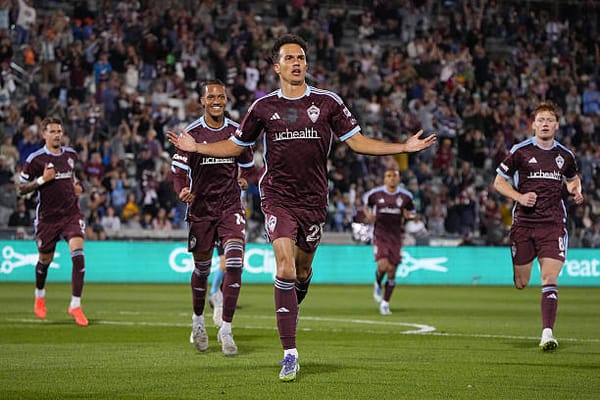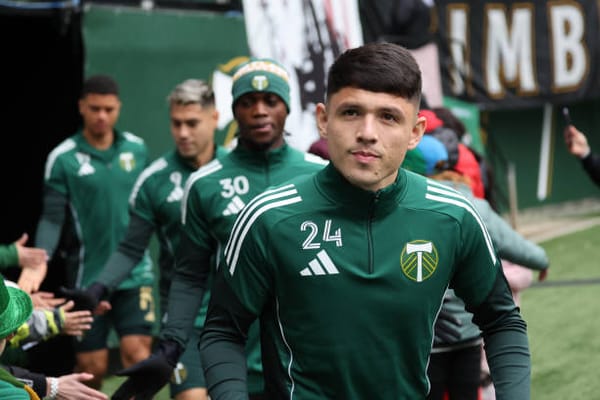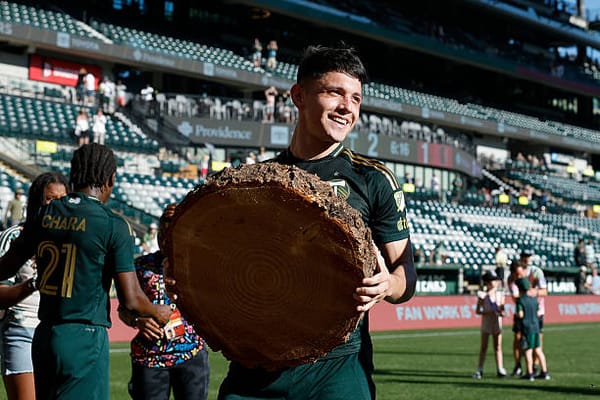The Actual Tale of Two Halves
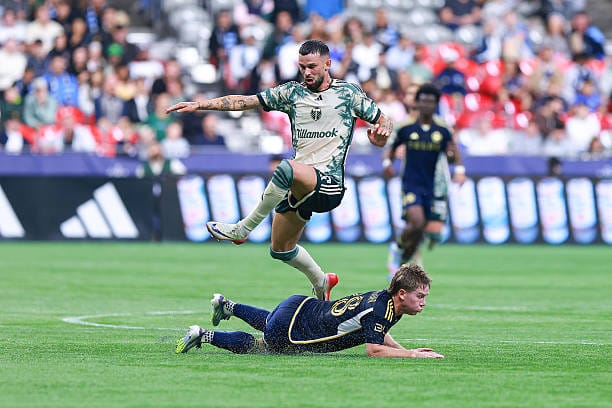
The Portland Timbers traveled to Vancouver and drew 1-1. And, somehow, it might be the most polarizing game of the season.
Recap
The first half might have been the best first half the Timbers have played all year. Portland began the game on the front foot, and maintained their pressure even after a frantic first 20 minutes of play. During this half, the Timbers peppered the Vancouver goal. In total, they registered 17 shots, with 13 of them coming from inside the box. However, despite several makeable attempts either getting parried by Yohei Takaoka or whistling *just* wide of the goal frame, their only goal came from the most unlikely of sources.
Kamal Miller latched onto a clearance and fired a rocket from approximately 30 yards across the face of goal and into the far post. It was the definition of a "screamer." In the 39th minute, the Timbers got their completely deserved goal. Somehow, it was fitting that the goal came from a center back after Portland’s defense spent the entire half limiting the Whitecaps to jack squat. Vancouver was able to move the ball, sure, but they weren't able to generate a single dangerous chance. With a 1-0 lead at halftime, the second half looked like the time to fully drive the nail in the coffin.
In typical Timbers fashion, they were left to rue the missed chances from the first half. Despite dominating the Whitecaps to a degree that they haven’t faced since a certain cup final in Mexico, Kamal Miller’s worldie remained Portland’s only goal when the final whistle blew. After the complete success of the first half, the Timbers took only one shot in the second 45. This was a 69th-minute Ian Smith attempt that went wide of the near post. The tables had completely turned, and the Whitecaps managed 13 shots in the second half. Like Portland’s box dominance in half number one, 11 of those 13 Vancouver attempts came from inside the box. But the Timbers kept defending their own box with aplomb until they just couldn’t do it anymore. In the 88th minute, Sebastian Berhalter’s corner kick was flicked on by Mathias Laborda onto the waiting right foot of Brian White, who easily slid it into the back of the net.
I want to get all of the discussion about Vancouver’s equalizer out of the way immediately. Some will point to it and say that the Timbers are failing at defending set pieces. I look at it a different way. It’s just more proof of how goated the flick-on header is.
There really isn’t another way to put it. Most flick-on set pieces fail because the danger man (target of the flick) is a half step behind the ball. This was evident in the 53rd minute when Laborda and Berhalter ran the exact same play with good execution but “danger man” Emmanuel Sabbi was a half step late to the flick. Defending a perfect flick-on header is almost impossible. The best teams struggle with it all over the world because the natural instinct is to pay attention to the ball instead of the “danger man.” I can’t even classify this as “ball-watching” because the play is too good. It’s so simple but so dangerous. I’m not mad at the Timbers for failing to defend a flick-on header. It’s the one type of set-piece tactic that is almost unbeatable.
White followed up his equalizer with a missed sitter in the 2nd minute of stoppage time. The Timbers improved on their last two meetings with Vancouver, but still couldn’t taste victory.
Finding an Outlet
The major talking point from this game is the stark difference between each half. To be more specific: why could the Timbers attack at will in the first half while finding it nearly impossible to do the same in the second half?
This answer is multifaceted, but I’m going to start with the basic answer. In the second half, Vancouver significantly upped the intensity of their high press. In a game against one of the best teams in the league in their own building, eventually you’re going to have to play the game on their terms. Because Vancouver was able to get back to what’s made them successful all year (outstanding organization in their defensive block with an emphasis on cutting out passing lanes) the Timbers were faced with their kryptonite: a high press. However, as the Timbers showed in the first half, there is a tried-and-true way to escape danger. The biggest difference between the first half and second half was a complete absence of a downfield outlet.
Listing this as only “a” downfield outlet is rather reductive. Portland’s attack needs at least two with a couple of support runners. Without those outlets, the Timbers’ ability to spring attacks is completely neutered.
In the first half, Kristoffer Velde and Mati Rojas acted as those outlets. Velde was a direct threat in behind, while Rojas set up shop between the left back and the left center back in Vancouver’s back four. Velde’s role is pretty self-explanatory: guy who runs in behind receives balls in behind. But Rojas’ role allowed Antony to constantly be available on the overlap. Two passes could spring Timbers attacks in the first half because Antony was usually on the end of the second. When Vancouver upped their pressure, and Antony was forced to stay deeper due to his role as a wingback, his support runs disappeared (for the most part).
The same thing occurred with Velde on the left, but Ian Smith’s support runs were still active. That issue boiled down to the lack of long balls over the top for Velde to run onto. Once he gets the ball, it’s very hard for opposing teams to get it back.
In addition, Portland’s go-to method for ball progression against the press was, once again, to try and pass through it. This is a choice that has failed the Timbers this season. It failed them last season. When they get pressed, they often try to avoid risk by playing long balls or cross-field switches. If you noticed, those types of passes were very prevalent in the first half. Against a press, they become one-dimensional. They require space to play their game, and refuse to try all available options to create that space.
This is where the mentality aspect comes into play again. Portland naively began the second half believing that it would be very similar to the first half. That’s a major mistake. I don’t believe that Neville’s halftime talk would have inspired that kind of naivete. Yesterday, the Timbers didn’t retreat into a block as their preferred method of choice. They were literally pressed into their own half, and merely failed to break out.
Player Ratings
James Pantemis: 8.6
This was easily Pantemis’ quietest game of the season, so I can’t give him a super high rating. However, he made the saves he needed to make and did a solid job with distribution. That first real save came in the 84th minute. I would be remiss if I didn’t mention the save on Berhalter’s shot in the 87th minute. Unfortunately, the ball went out of bounds, and Vancouver scored on the resulting corner. Damn, those missed chances.
Finn Surman: 9
Two notable Finn Surman moments came from this game. The first was a pretty blatant shove of Jayden Nelson in the 29th minute. This didn’t earn a whistle (in the sake of fairness, it probably should have) but the immediate aftermath makes this moment notable. He immediately did a little gloat as he retreated back to his position. Hilarious.
Seven minutes later, he fired in a quality cross to Kevin Kelsy whose resulting header forced Takaoka to make a pretty good save. There are so many different ways to look at this play. You could laugh at the irony of a center back providing Kelsy with quality service. You could admire the quality of the delivery. You could realize that Surman ended this game with a single created chance, which is also pretty cool. Or you could look at this specific play to illustrate a difference between the first and second halves (Surman having the ability to get forward because the defensive line is able to push up into Vancouver’s half). I’m looking at it in all of those ways.
The 22 Under 22 list is published by MLS around this time. The rules are pretty clear: you cannot turn 22 during the calendar year. Yesterday was Finn Surman’s 22nd birthday. Drat, but also congratulations. Just like Ayala last year, his age has prohibited him from receiving national recognition. However, although he is ineligible for the list, every team knows how good he is. So do Timbers fans. He’s got my vote for Supporters’ Player of the Year.
Dario Zuparic: 8
Another consistent Zuparic outing, but one moment stands out. In the 47th minute, he was battling for the ball with Vancouver’s Rayan Elloumi. The young Whitecaps striker went down, and handled the ball while on the ground. Zuparic, who wouldn’t let this tomfoolery pass, kicked the ball. Since Elloumi was basically crouched on the ball and showed no willingness to get up, this was a justified move. Referee Jon Freemon blew the whistle and booked Zuparic. Whatever. I’d be a lot angrier at this call if Vancouver scored from the resulting set piece. However, each team got away with stuff during this game, so it’s not a horrendous call when taking the entire game into account.
KAMAL MILLER: 10
You’re going to think that this rating is entirely derived from the goal. That’s incorrect, but the quality of the goal bumps it up from a 9.5 to a 10. I’m incredibly angry that a strike of that caliber occurred and 3 points didn’t come with it. I haven’t reacted like that to a Timbers goal since Evander’s winner against NYCFC. There have been some spectacular Portland goals in that timeframe, but none have elicited the exclamation “OHHHH- HO HO HOLY SHIT” like Miller’s strike. It was a fitting tribute to Jack Jewsbury, who scored a similar goal from almost the exact spot 13 years ago. After the ball hits the back of the net, he turns away from the goal and screams “STOP FUCKING PLAYING WITH ME” multiple times. Upon review, it looks like this was directed at the Timbers’ bench. I’d like to think it was directed at everybody from the coaching staff and his teammates to everybody watching this game.
Miller’s last start prior to tonight was on August 16th. He hasn’t seen the field since that game. As Zuparic’s excellent form led to the starting role, Miller was seemingly benched as Portland’s 3rd center back. However, in a back three, the Timbers needed a third centerback. This was Miller’s big opportunity to play his way back into contention for a starting spot. And he got that opportunity against Vancouver, in the reverse fixture of his infamous red card in the season opener. His response was flawless. Defensively, he was a rock. Although his counting stats aren’t gaudy, his positioning and ability to pick a pass were outstanding. This was a game that needed a big Kamal Miller performance. He delivered in droves.
Antony: 8.7
I actually struggled with this rating. It’s really tough to grade a player who was out of position but excelled nonetheless. Let’s start with his attacking output. As the width provider on the right, he was outstanding. Rojas’ tendency to play in the channels was perfect for Antony, who was able to fly up and down the right in the first half. I’m docking a few decimal points for the quality of some of his crosses, but being able to provide service was one of the primary reasons why he was deployed as a wingback. He did a good job defensively, especially during his recovery runs. The poor part of his defensive performance was when he was asked to defend like a fullback with an attacker in front of him. That’s not his job in general, so it didn’t surprise me that Ali Ahmed was able to get the better of him multiple times in the second half. In the first half, Jayden Nelson’s proficiency in transition played into Antony’s defensive strengths.
Jesper Sorensen effectively changed the game when he subbed Ahmed in for Nelson at halftime. This kept Antony pinned, and limited his support runs. It seems like a stretch to call him Portland’s most important player in the first half given the excellence of Velde, but tonight’s game speaks to how much the Timbers rely on their right-sided width.
Cristhian Paredes: 8.5
Although he was more impactful in the LAFC win, this might have been Paredes’ best game of the season. This grade isn’t as high as that LAFC win, but I’m here to remind you that each rating is based on the game, not the season as a whole. A 10 in one game could be an 8 or 9 in another one. It all depends on the story of the match. None of these ratings are mathematical in any way either. Some of y’all are still confused about that. Let’s continue the train of subjectivity now that we’ve had a refresher on the rating system.
I’m going to begin by saying this: it absolutely sucks that Felipe Carballo won’t play for the rest of the season. Tonight’s game was tailor-made for a player like him. However, his absence has proven to be a motivator to the other central midfielders on the roster. After a couple of very good Joao Ortiz games, it was Paredes’ turn to get a start at the 8.
The standard definition of an 8 (my personal definition, at least) is a midfielder who can impact play in both boxes while being able to perform the basic midfield duties (ball progression, tackling, holding position). Paredes succeeded at every one of these qualifiers tonight. My favorite part of his performance was his ability to draw fouls. But he completed 6/7 long balls (most of them were diagonals) and played a huge part in Portland’s first-half dominance. Alas, he is not an elite dribbler, so Vancouver’s heavy pressure necessitated quick combination passes in the second half. Most of these passes missed, but I wasn’t too upset with them (for some reason). Had the support runs been available, it wouldn’t have been a problem. With Ayala and Chara clearly earmarked as the sixes, Paredes and Ortiz are competing for the 8 spot. Ultimately, I think that it’ll come down to the opponent to dictate which one of them gets the start. Tonight’s game called for Paredes, and he rose to the occasion.
Diego Chara: 8.2
Did y’all notice that this was Chara’s first start since August 6th against Club America? In that timeframe, he’s made 5 substitute appearances. The last time he played past the 70 minute mark was against Atletico San Luis on July 30th. In league play, that stretch extended to July 16th against RSL. He has made one-and-a-half times as many substitute appearances as starts in 2025. Somehow, that’s insane to me. But he is 39 years old, and tonight’s start was his 399th in a Timbers uniform. He also received his 125th yellow card for a clear tactical foul. Congratulations to him.
I thought he slowed down a bit in the second half, which was a clear contrast with his excellent first half. That’s fine. He’s 39. Start number 400 is on the doorstep, and I think he’ll do it in Seattle. Cool!
Ian Smith: 9.1
When the Timbers were using the back three earlier in the season, I called Ian Smith one of Portland’s most important players. His best position is wingback, and I’m pretty sure he’s first-choice in that role ahead of Jimer Fory (who is an outstanding left center back). Tonight’s game was more evidence to put in the file cabinet.
This outing was so good that it deserves the Stathead treatment. Here are today’s parameters: 4 shots, 2 shots on target, 2/2 tackles completed, and an (outstanding) yellow card for funsies.
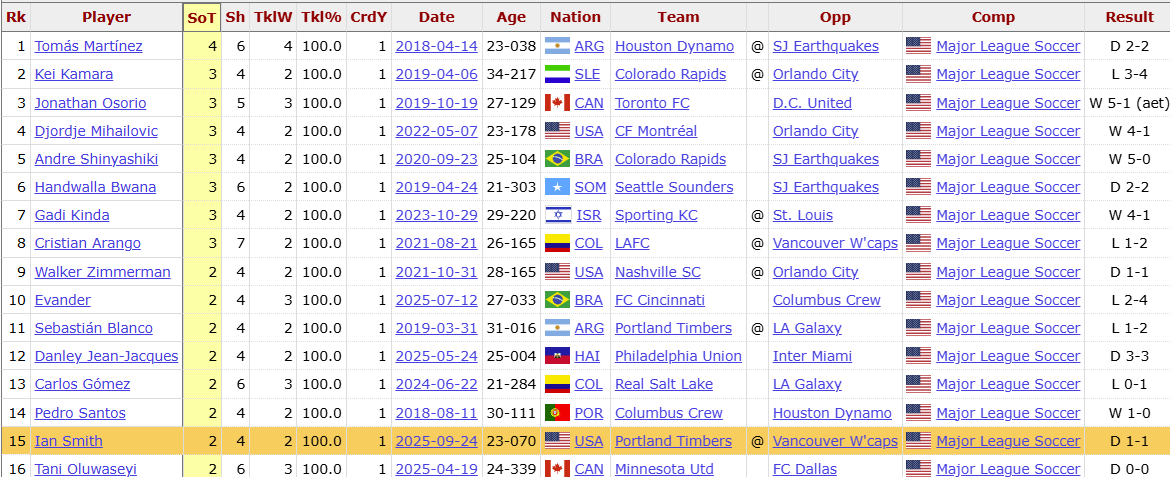
This isn’t an incredible statistical showing, but he’s in pretty good company here (hi Seba). He’s the only fullback/wingback in this sample. That’s a very good two-way showing from Smith. One of those shots was Portland’s only attempt of the second half. I wish he was able to provide a little bit more service into the box, but his chemistry with Velde allowed attacking lanes to open. The one thing he probably wants back is a missed header in the 45th minute.
Mati Rojas: 8.9
I wish that ASA’s Viz Hub updated immediately after the conclusion of a game. In total, he created 6 chances during his shift. I’d like to see the map of them, but that will have to come at a later time (I’ll post it on socials). My prevailing theory is that about half of them came from corner kicks.
Portland’s inability to fully capitalize on corner kicks has been an issue in 2025. With Rojas standing behind the ball, that part of their game should be vastly improved. And in this game, it was. I’d like to highlight his 4th minute corner. As the de-facto playcaller for these plays (with the play being determined by his hands being raised, this is standard) he chose a direct delivery to Velde. The ball was perfect, but the shot was just wide. However, the movement by other Timbers players in the box opened the space for Velde’s attempt. Rojas chose not to run this play for the rest of the game, despite taking 7 more corners. That earns him a 0.1 point deduction (I told you these ratings were incredibly subjective and changed based on the game).
However, his role as an inside forward (different from Portland’s prior use of the back three with two 10s) opened up even more space for Antony to bomb forward on the right. Rojas succeeded at hold-up play, and was a threat whenever he touched the ball around the box. He has to start every game for the rest of the season. It isn’t debatable.
Kristoffer Velde: 8.3
The other inside forward on the pitch was Velde. I continue to be baffled that he hasn’t found the back of the net yet. He took 7 shots and only two of them found the target. That’s OK, but also it isn’t. Some of those shots should have found the back of the net. But it’s exciting because he played like a DP. I’m conflicted about the idea to take him off the pitch in the 83rd minute. He needs to be saved for Dallas, sure, but he represented Portland’s best chance of adding a second goal. Even with momentum completely in Vancouver’s favor, Velde strikes me as the type of player who could create magic out of nothing.
Kevin Kelsy: 7.2
Kelsy hit the target with both of his shots. I don’t think they were incredibly good chances that should’ve been scored, but he offers a lot more than Felipe Mora at this point in the season. Kelsy, in a way, acts as another downfield outlet due to the way center backs have to mark him. At 6’4”, he has surprising speed for a big guy. This makes center backs have to be aware of his threat in behind.
*This is going to ruin the transition to Mora’s section, but I have to say the following: it looked like Kelsy wasn’t too enthused with Kamal Miller’s goal. I find that hilarious. Strikers want to score goals, and his nonplussed reaction to an absolute worldie is unbelievably funny.*
Felipe Mora: 6
Conversely, Mora does not offer a threat in behind. As Portland’s best ball-playing striker, his value comes from his ability to hold up the ball and play wide passes to change the point of attack while finding the spots in the box to get on the end of crosses. This is ideal for a closed, compact game where the smaller spaces and possession play are more important. When the Timbers began to get pressed into their own half, Kelsy was the better player to act as an outlet for the types of balls that could break that press. However, it should be noted that Mora could thrive in this type of game, but the support runs were non-existent. As a result, every ball into his feet either turned into a direct turnover or an eventual one.
For the second straight game, he didn’t take a shot. However, he came pretty close. In the 67th minute, Da Costa played a teasing cross into the box but Mora was a half-step behind it. That’s been the bigger issue. There are times that the service has been there, but Mora is *this* close to getting on the end of it.
Two moments in stoppage time warrant some further attention. In the 3rd minute, he’s used as a downfield outlet but is quickly closed down and wins a throw-in. In the 6th minute, he becomes a downfield outlet again to get on the end of a pass from Ariel Lassiter. He dribbles across the field and finds Eric Miller on a diagonal (some might say that a reverse pass to Da Costa is the better option here). It isn’t his fault that Miller’s cross misses everyone in the box. But it is a point to be made that when the Timbers are playing quickly, Mora can be a net positive for Portland. He just needs to score a goal, more than anything. He hasn’t been the same since missing that penalty against Colorado. The goal drought has reached 19 league games.
David Da Costa: 6.8
I don’t think Da Costa was necessarily bad tonight. Unfortunately, there is one moment that is sticking in my mind.
Apple still won’t let me clip things, so I’d urge you to go to the final minute of the game in the replay. Da Costa receives the ball from Eric Miller and is driving forward. Antony is making a run in behind, but Da Costa is facing Vancouver’s Jeevan Badwal. Da Costa isn’t able to make an entry pass (probably one over the top, given the positioning of Vancouver’s defense) or keep driving forward against the 19-year-old midfielder. Instead, he makes a circuitous run through the middle before attempting a bounce pass with Paredes. Immediately after receiving the ball, he passes it backwards to Kamal Miller. The final whistle blows seconds later.
Such a promising counterattack with a support runner in the dying seconds of the game needed Angry DDC instead of Passive DDC. It’s unfortunate that this sequence is his defining moment of the game. A dangerous cross to the far post in the 82nd minute forced a corner, but that was his biggest creative moment of the game.
I’d like to look at one more stat to illustrate his performance. After entering the game in the 62nd minute, he only touched the ball 14 times. Here’s how those touches were spread out: 2 in Portland’s box, 8 in the defensive third, 5 in the middle third, 2 in the final third, and 1 in Vancouver’s box. I don’t think he had the supporting runs that Rojas benefitted from in the first half. But at the same time, he is Portland’s DP number 10. When he enters the pitch, he should be begging for the ball. Playing in the second line forces the Timbers to get the ball to him, and he was making some good runs in behind. I didn’t see the sluggish performance against Houston in this game. But I did see a team that needs him to become more actively involved in buildup. Those bounce passes are a great way to get him in space. Gotta drop deeper and start to use those to break a high press.
David Ayala: 6.5
Ayala’s outing illustrated how hard it is to be a substitute as a defensive midfielder. With the Timbers pinned in their own half, Ayala wasn’t able to enter the game and make a positive impact. He turned the ball over quite a bit, and looked a little off-pace defensively. I’m willing to give him a pass given his recent workload and the tough circumstances that he faced upon entering the game.
Ariel Lassiter: 7
His first action on the pitch was delivering a corner kick that resulted in a flick-on header. As stated before, I love flick-on headers. In open play, Lassiter was another progressive force. He’s a perfect player to bring on as a width-holder.
Eric Miller: 6.8
Miller was the flicker of Lassiter’s corner kick, and he was unlucky that no one got on the end of it. Once again, I love flick-on headers, so I have to give Miller some props here. However, he needs to do better with that crossing opportunity in the 6th minute of stoppage time. There were more Timbers than Whitecaps in the box.
Coach Rating: 8
This is going to be controversial, but it really shouldn’t be. I’d like to begin this section with a quote from the latest Outside the Box podcast. I’m a co-host for this show, and I wasn’t able to appear on this week’s edition. However, my fellow co-host Josh (Joss) Bathtub had this to say about Austin’s Nico Estevez: “The 3-4-3 is one of the toughest formations to get right, and it takes a good coach to get it right.”
Nico Estevez is not Phil Neville, but this quote is absolutely correct. A fascinating subplot to Portland’s season is their continued growth in the 3-4-3 structure. Each time they use it, they look better than the last. Tonight’s first half compared favorably to the first half against LAFC; another game that featured the 3-4-3. In both of those games, Portland started strong and stayed strong throughout the first half. Their goals didn’t come from the most likely of sources, but there were chances that could have been buried that were directly related to their in-possession setup.
A coach’s job is to properly give his team a platform for success. I firmly believe that Neville gave his players that platform in tonight’s game. He can’t control every touch of the ball, every cross, or every shot. That’s where the players have to execute. They didn’t. I don’t think that’s on him.
The main story of the second half were the subs. Do I think that Neville properly adjusted to Vancouver’s increased pressure? No, but I also think part of that is on the players. The support runs have to be made. Long balls have to be played to stretch the field. The Mora/Da Costa substitution should have worked, but the Timbers were unable to get them the ball (and Da Costa was unable to drop deeper). The Ayala/Lassiter substitution should have worked, but Vancouver had completely turned the game in their favor at that point. The Velde/Eric Miller change is a little more suspect, and I understand the unpopularity of the change. But, once again, Antony moved farther up the field and the Timbers failed to play long balls in behind for him to chase. These substitutions should have worked. At the very least, they should’ve led to more chances on the counter. I don’t have a problem with the ideas behind the substitutions. It’s on the players to execute.
In the wide-open first half, Portland set up shop in the middle third and put up a wall around their box. Despite Vancouver’s ability to progress the ball to the edge of the box, Portland’s defense kept them from getting into the box. A combination of strong rest defense and good back pressure (hello Antony, Smith, and Paredes) were critical to their domination in the first half. Once again, the game plan was successful, but the players didn’t execute.
Rather than pointing fingers at Neville, who rebounded very well from a bad setup against the Dynamo, I think the Timbers are desperate for a vocal on-field leader in the front six. Kamal Miller, Finn Surman, Maxime Crepeau, and James Pantemis are excellent on-field leaders from the back, but Portland’s continued issues with build-up against a press necessitate a vocal presence in the attacking group. Maybe Velde becomes that player. Maybe Rojas becomes that player. I don’t think there was one on the roster before those two joined the team in August. Neville is constantly preaching about mentality FOR A REASON. It isn’t just empty words. Was the second half great from a tactical perspective? No. But it could have been better if the players were able to execute to their full ability.
Bottomline: the Timbers did not park the bus in the second half. They got pressed and couldn't break out. Stop the nonsense.
Table Time
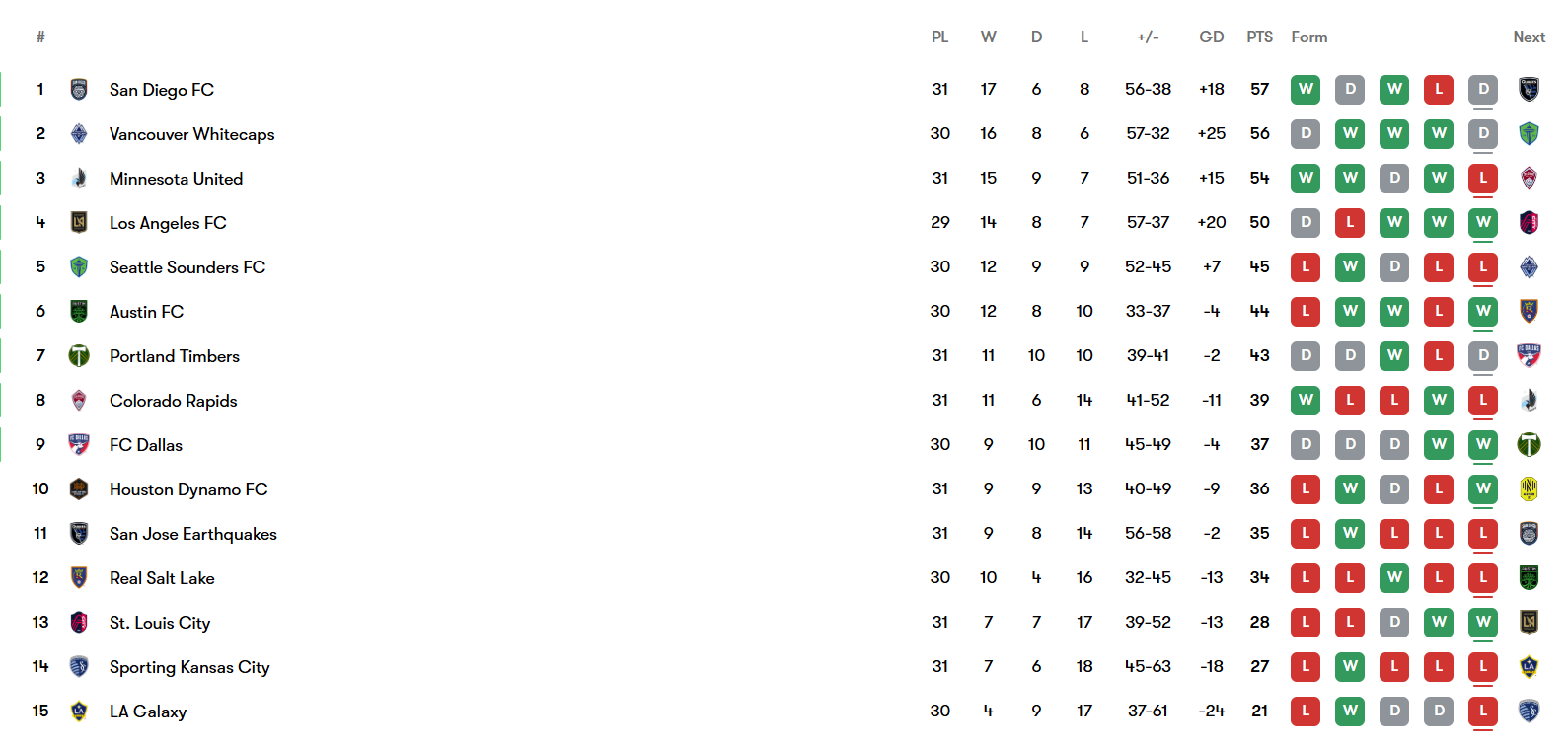
Portland remains in 7th and Austin now exists in Game-in-Hand Land. Technically, the Timbers are still within the range of the 5th seed, but they do not control their own destiny. They are 4 points ahead of the Wild Card, and Dallas is 6 points behind the Timbers with a game in hand. Saturday’s game is shaping up to be a six-pointer. From the Vancouver perspective, they no longer control their own destiny for the Shield. They’re still in the driver’s seat for the top spot in the West.

Congratulations to the Vancouver Whitecaps for winning the Cascadia Cup. It would take a herculean effort from the Seattle Sounders to overcome Vancouver’s stranglehold on the trophy, and any result against Seattle on Saturday will be enough for the Whitecaps to clinch it. Yeah, it’s not mathematically theirs yet, but they always find a way to get a result no matter who is on the pitch.
Final Whistle
Many fans have spoken about tonight being a “bad result.” It isn’t, unless you’re strictly looking at the dropped points angle. The hallmark of this Vancouver team is their ability to remain competitive (and even elite) no matter who is on the field. It’s kind of terrifying. There’s a reason why they’re still challenging for the Supporters’ Shield despite the weight of two cup runs (CCC and Canadian Championship) on their already tired legs. Portland’s chance to win was in the first half, and they didn’t convert their chances. It’s a tough one to take, for sure.
However, it’s also worth noting the results of their last two matches against these Whitecaps. Some people were expecting a loss by multiple goals or another complete humiliation. But the Timbers, once again, played to the level of their competition. That’s what this game averages out to. Portland was far superior in the first half and completely inferior in the second. If these two teams happen to meet in the playoffs, I’m intrigued to see how it would go. There is no formula to beat Vancouver; you just have to finish your chances and defend the box. Portland accomplished the latter while failing to execute the former.
After the game, Phil Neville alluded to this match being a story of Portland’s season. “Our Achilles’ heel this season is not punishing teams with opportunities to score.” This is correct, even though they are still struggling with consistent chance creation. Their work off-the-ball looked a lot better, particularly in the first half. I would like to call this something to build on, but the second half showed how much work this team still has to do.
Saturday’s game against Dallas is the most important game of their season (so far). Each of their final three games (Dallas, Seattle away, and San Diego) will require more performances like tonight’s first half to secure results. But the 2025 Timbers are struggling with half-to-half consistency. Tonight’s game was supposed to be finished in the first half, but the Timbers couldn’t finish it. Not in the first half, not in the second half, and certainly not at the end. But the case for the back three continues to grow. Neville actually has a major decision on his hands. A back three definitely benches Da Costa. But a back four can’t allow for those mouth-watering possession sequences in the first half. It’s a tough fork in the road for the Timbers to be at as September comes to a close.
I’m still walking away from this game with more positives than negatives. It’s pretty easy to say that Jesper Sorensen is a better coach than Neville. He’s the best coach in the league, for crying out loud. There’s a reason why the Vancouver Whitecaps have been, on a consistent basis, the best team in MLS in 2025. On the surface, this isn’t a bad result. But for the second time in four games, the Timbers have dropped points on the road against a top-four team due to a late goal. They need to win one of these games. And tonight, they simply didn’t. The climb continues.

